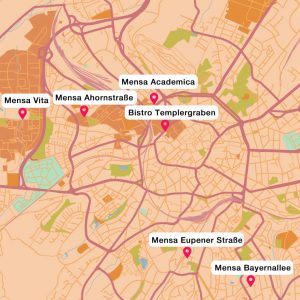Miscellaneous Frequently Asked Questions
Semester ticket
Once you receive your semester ticket, you can travel with it free of charge throughout NRW. You can use nearly all local transport (bus, train, tram, subway, etc.) with an expectation of high-speed trains such as IC, ICE and Thalys.
Keep in mind that first class tickets are not included and to take your bike with you on the train/bus, you need an additional ticket.
Rundfunkbeitrag
Rundfunkbeitrag, which means broadcast contribution, is an amount of money that every household in Germany is obligated to pay every month for consumption of public service broadcasting. However, it doesn’t depens on whether you have a TV, radio, laptop or not and how much you use these media.
Topic: Mensa
As of 01.06.2022 Mensa meal prices have changed; an increase of either 0.10 € or 0.30 € is being implemented.
The prices for students now are:The Mensa offers students a wide range of healthy meals at affordable prices. Comprised of nine dining halls, seven cafeterias and four coffe bars in Aachen and Jülich, it's a student favorite!
It is run by Studierendenwerk Aachen, therefore their meal system is designed in a way that is easy for students to make use of.
Their services include:
Vegan/ Vegetarian options:
At the Mensa you will always find options that cater to certain diets.
International Cuisine
As the menus differ from day to day, there are a variety of cuisines that you get to try.
Coffee and Snacks
If you’re in the mood to lounge in the morning with some friends, the Mensa has coffee bars where they serve beverages and snacks such as cakes and sandwiches.
Payment is done via the BlueCard, FH Karte or with a student visitor card you can acquire at the information desk.
Cashless Payment System
You can link your BlueCard to your credit/debit card and top it up. You sign up for AUTOLOAD at the Studierendenwerk Infopoint (Mensa Academica).
Paying with Cash
You can add money to your card at the information desk and entrance points at the card loading terminals.
Mensa Academica
Mon–Fri, 11:30 a.m.–3 p.m.
AcademiCaffè
Mon–Fri, 7:30 a.m.–14:30 p.m.
Mensa Vita
Mon-Fri, 11:30 a.m.–2:30 p.m.
Caffè-Bar Vita
Mon-Fri, 11 a.m.-3 p.m.
Mensa Ahornstrasse
Mon-Thu, 11:30 a.m.-2:30 p.m.
Fri, 11:30 a.m.-2 p.m.
Bistro Templergraben (Takeaway only)
Mon-Fri, 11:30 a.m.-6 p.m.
Mensa Bayernallee
Mon–Thu 11:30 a.m.–2:30 p.m.
Fri, 11:30 a.m.–2 p.m.
Caffè-Lounge
Mon-Fri, 7:30 a.m.-3:30 p.m.
Mensa Eupener Strasse
Mon-Thu, 11:30 a.m.–2:30 p.m.
Fri, 11:30 a.m.–2 p.m.
German Healthcare
In Germany it is usual to have a general practitioner, Hausarzt, who you go to for any general medical concern you may have. The Hausarzt assesses your condition and provides treatment or refers you to a specialist in case you need one. You do not necessarily need to register with a specific doctor, as most practices will see any patient, but it is recommended.
If you are not in an extreme situation, your first contact should be your Hausarzt. In case you don’t have one, or your Hausarzt isn’t available you can always call the medical on call service at 116117. You can also go to the emergency room at any hospital, such as Uniklinik, Luisenhospital or Marienhospital. There is also a dental emergency medical service.
! Pharmacies have different opening hours. Each weekend there are different pharmacies which are open for urgent cases.
In extreme cases, when you are in need of an ambulance or immediate assistance, you should call the emergency number 112. If you are not sure if you are in a life-threatening situation you should also call this number.
! Remember to keep calm and answer the questions as to what, where, when and how the emergency occurred.
Health insurance is mandatory in Germany. Your public health insurance (such as AOK or TK) cover all of the necessary medical expenses you have (some exclusions may apply). Just make sure that the doctor you go to accepts public health insurance payments (Kassenarzt). In case you have a private health insurance, you should check directly with them what services they cover.
If you possess a European health Insurance Card it would cover your costs in case of an emergency. You need to get your European health insurance certified at a German public health provider of your choice in order to be enrolled at the German university. Once you are officially a student, you can use your European Health Insurance Card in emergency cases directly in any medical centre without any further registration needed prior to your medical consultation. If you get an employment aside your studies though, you must then get a regular German insurance.
